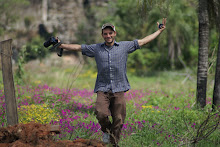With the creation of Peace Corps Response/ Crisis Corps, Peace Corps has taken the development spotlight and shown it on itself: Identifying resources and putting them into practice. With each Close Of Service (COS), Peace Corps worldwide adds to its growing tally of linguistic, technical and culturally competent development professionals. Returning RPCVs to service for short term targeted development projects through Peace Corps Response taps this “in house” resource.
Shifting gears from a traditional Peace Corps service to a Peace Corps Response service does not change the fundamentals of Peace Corps’ mission; however, it does call for a redefinition of the focus, scope and pace of how the objectives are executed.
My name is Leo Redmond. I am the Agroforestry Technical Trainer.
I served as an Agroforesty Volunteer in Paraguay from 2002-2004.
I served as a Crisis Corps Guatemala Volunteer in 2006 in Post Hurricane Stan Disaster Preparedness, Emergency Management and Food Security.
I served as Peace Corps Panama Response Volunteer in 2008 in Food Security.
I worked previously as the Peace Corps Paraguay Agroforestry Technical Trainer between 2005- 2007.
Serving as a Peace Corps Response Volunteer (PCRV) is in a sense, a true embodiment of the old adage, “If I only knew then what I know now.” There is a huge difference between Peace Corps Volunteer Day One and Peace Corps Response/Crisis Corps Volunteer Day One. Rightly so. As a new PCV arriving in a community, you should take a step back and listen; however, as a PCRV, you have the golden opportunity to hit the ground running. You are the linguistic and technical competent extension agent that is capable of making decisions and putting projects into motion. More importantly, with years of field based extension experience, you have the confidence to do so.
There is a subtle but important distinction in the PCRV presence and design which sets it apart from traditional PCV experience. Although trained in a specific skill set, Volunteers are decidedly community based, where as Response Volunteers are more project based. Ideally, a Response Volunteer’s energy and expertise is more targeted to address a defined, expressed need on the part of a host country organization.
The upshot is that Response Volunteer results prove to be more tangible in nature: Plant 5,000 citrus trees, 10,000 coffee seeds. Train 30 community members in proper first aid and emergency management procedures. The short term, three to six month, assignment also means that our work is that much more accelerated. In effect, we step in at the precious moment to connect project materials, technical know how and community involvement in order to put them all into play. It is quite a tantalizing position to be in, but fundamental development tenets must not be overlooked.
Conversely, a traditional PCV experience is comprised of incremental, accumulative progress where at times the efforts and results are more qualitative than quantitative: teaching critical thinking skills, fostering communication, capacity building.
The core of a PCV Service is dedicated to community development and resource identification. Ideally, a PCV helps to set the tone where a community, certain community members or individuals can engage in successful project establishment. In this sense, the focus, scope and pace of a Peace Corps experience is much more evolutionary, fluid and subject to indeterminable fits and starts.
Peace Corps Response Volunteers have a sharper focus, narrower scope and heightened pace of project implementation. Where at the end of our service the project should either be put into motion or completed. Intrinsic risks of a Response Volunteer include becoming involved in too much, too fast, as well as promising more than can be feasible completed in the allocated time of service. Although stationed in a community of 100 families, the objective is to work with 10 targeted/previously selected families.
In the end however, Development, by nature, is designed to be an unfinished business. Traditional two year Peace Corps service is rock bottom, fundamental to setting us all on the way for individual, community and global improvement. A Peace Corps Response Service is a brilliant way to return to the carefully laid foundation and take another important step forward.
